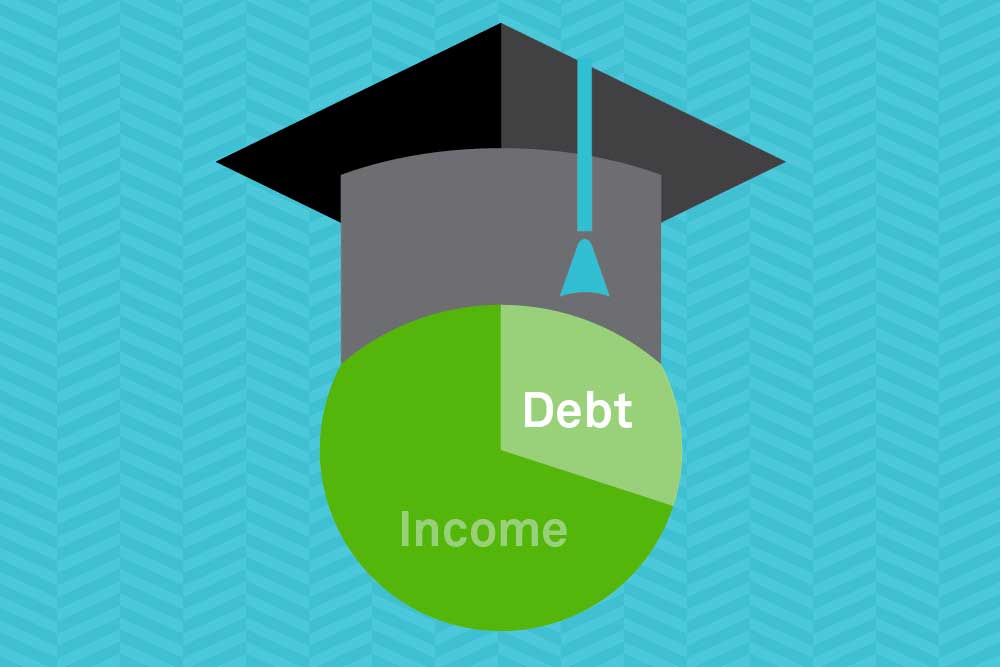Deborah Sweeney graduated with both a master’s in business and a law degree in 1999. Though she was saddled with about $80,000 in student loan debt, it didn’t stop her from buying a home.
In 2002, at 24 years old, she and her partner had saved enough money to buy their first home. Even though they were approved for a $750,000 house, they opted not to stretch their budget and instead bought a property for $630,000.
“While we certainly could have found something more economical, we wanted something we could live in and then have a family within a few years,” Sweeney says. “We also live in Los Angeles, so the housing prices are expensive.”
When she qualified for her mortgage, she was able to reference a few years of work experience at a law firm and good credit from paying her bills on time — including her student loan.
“I consolidated my loan, and I always paid more than the actual monthly payment to pay down my loan as quickly as possible,” says Sweeney.
Buying a home requires showing proof of income and having sufficient funds for the down payment and closing costs, as well as reserves of up to six months of mortgage payments.
There are different mortgage and down payment assistance programs that you may benefit from, and talking to a lender can help you understand what makes sense for you — but here are a few things to consider as you start the process.
Pay your bills on time
“The important thing to know is debt is debt, and we look at student loan debt like an auto loan, credit card, or any other type of loan,” says Sean Hulsey, area sales manager for Wells Fargo Home Mortgage.
If your payments haven’t started, Hulsey suggests creating a habit of paying your loan by putting aside that money six months before your payments begin.
Most mortgage lenders have similar requirements for borrowers: a borrower’s credit and debt burden are key.
“The important thing is that consumers are making their debt payments on time,” says Hulsey.
Know your DTI
Lenders look at how a borrower manages his or her debt load by calculating a borrower’s debt-to-income (DTI) ratio, or the percentage of monthly income that’s used to service debt.
In general, lenders want borrowers to have a DTI ratio that’s no higher than 36%.
“There are compensating factors for us to approve a DTI above 36%, like high credit ratings, high income, or high savings,” says Hulsey.
Depending on the amount of your student loan, you can lower your DTI by taking advantage of different repayment options.
“One way a student loan borrower can increase the likelihood of qualifying for a mortgage is to choose a student loan repayment plan that yields a lower monthly payment, such as extended repayment or income-based repayment,” says Mark Kantrowitz, senior vice president and publisher of Edvisors.com.
Lower your payments
Borrowers with more than $30,000 in federal loans can extend repayment terms to a maximum of 25 years without consolidating their loan. When consolidating a loan, repayment terms of up to 30 years are determined by the amount of the total debt borrowed. Borrowers qualifying for income-based repayment plans have limited student loan payments of no more than 15% of discretionary income.
No matter how you do it, when you lower your monthly student loan payment, you ultimately lower your DTI ratio, which could help you qualify for a mortgage.
“We look at the overall picture of the customer, and every borrower is different,” says Hulsey. “The main thing is their ability to manage credit and their debt load and to repay the mortgage.”
Weigh the risks
“You have to remember, every time you take on more debt, you take on more financial risk, too,” says chartered financial analyst Robert Stammers, director of Investor Education for the CFA Institute.
Since having a student loan and mortgage makes you highly leveraged, if there’s a hiccup in your income and you have insufficient savings, making all your payments on time could be challenging.
As you look at homes, consider what you can afford and what you’re willing to pay — along with student loan payments, mortgage payments can be hefty. Even though you may qualify for a $1,500 housing payment on paper, it might be smarter to go with the loan that you’re most comfortable incorporating into your budget.


